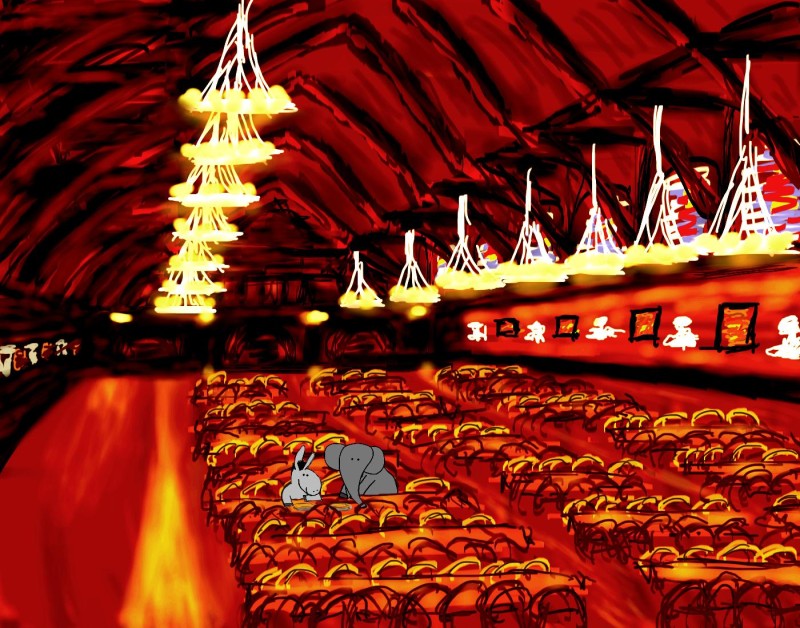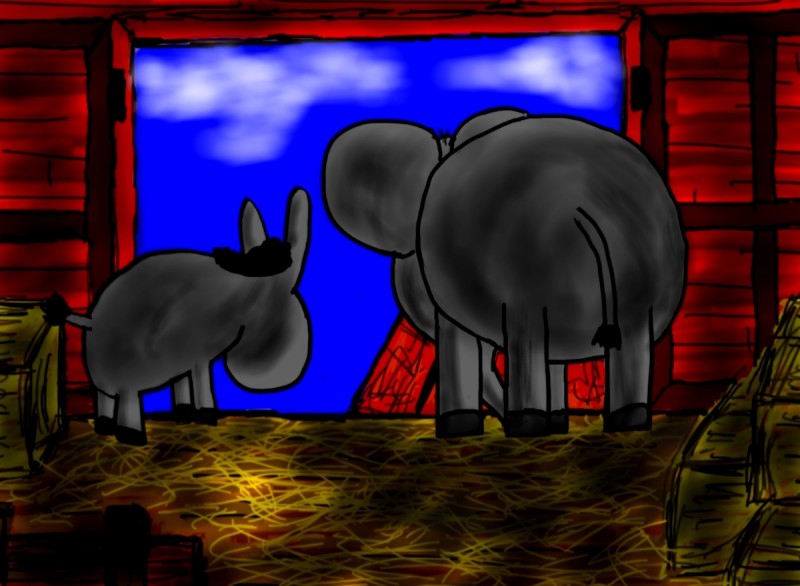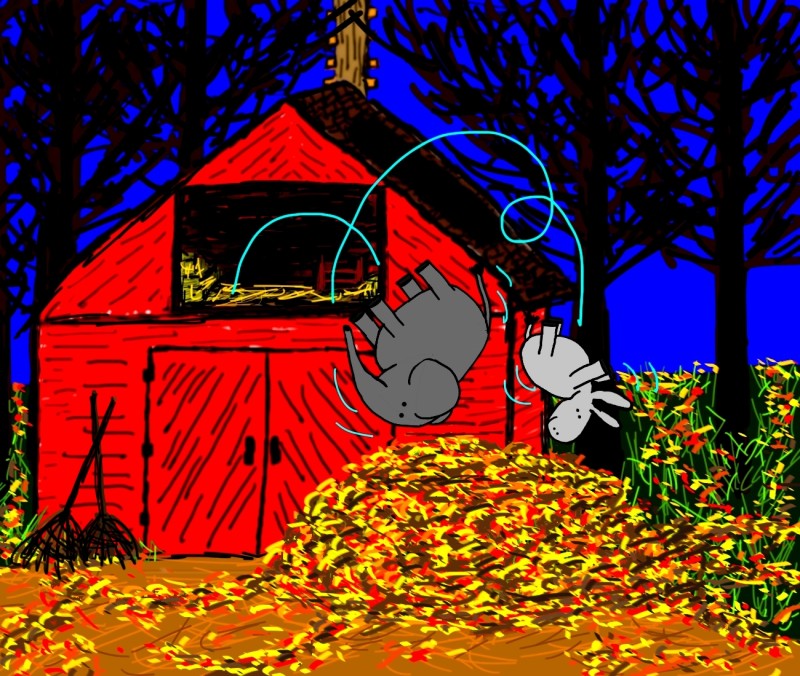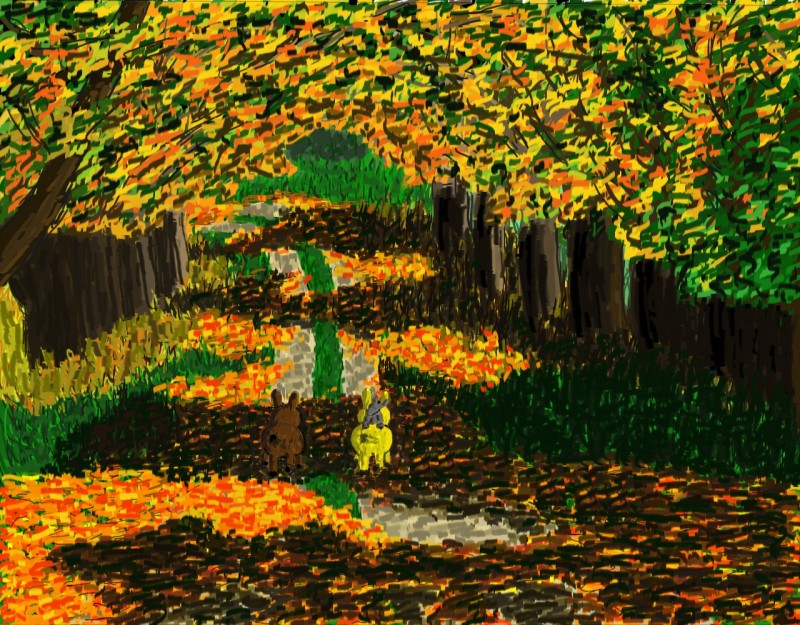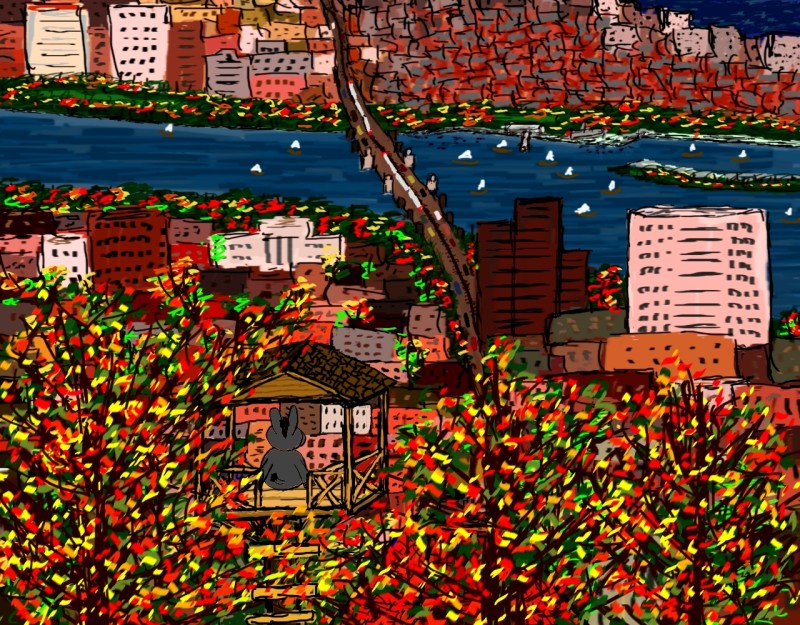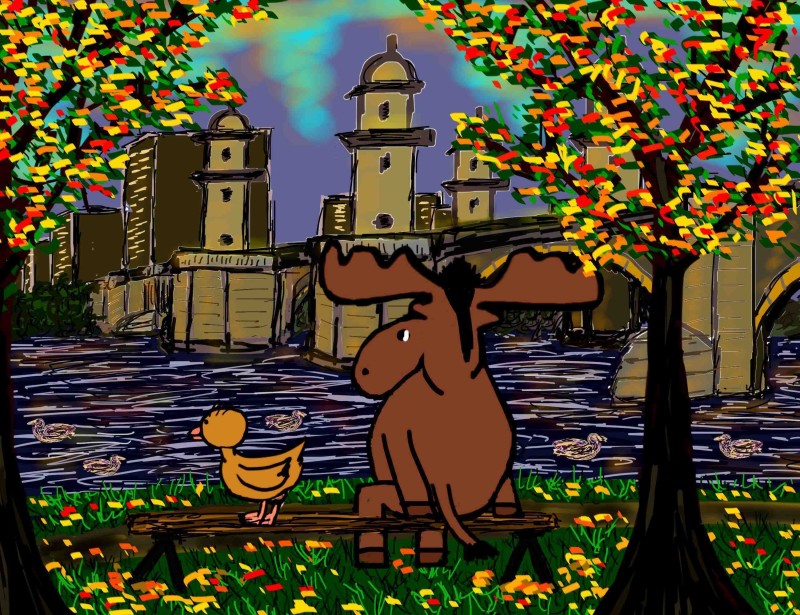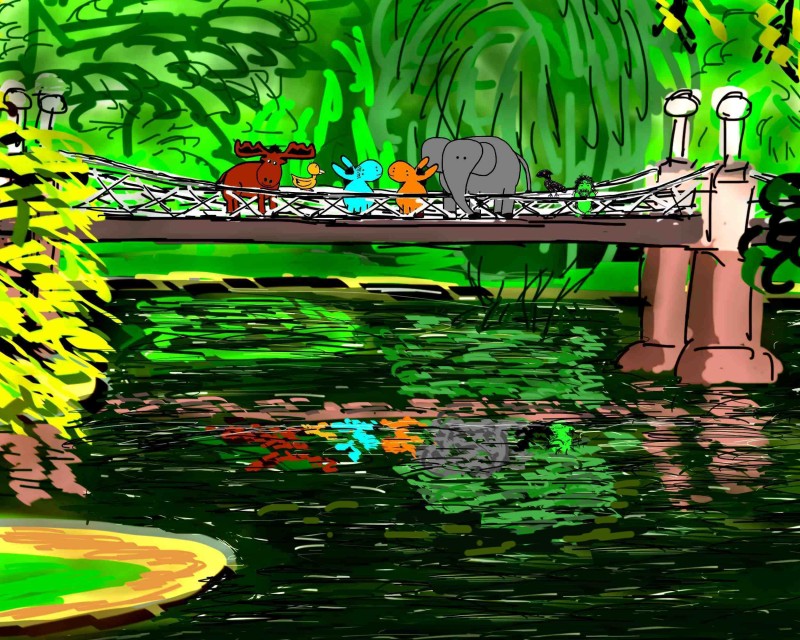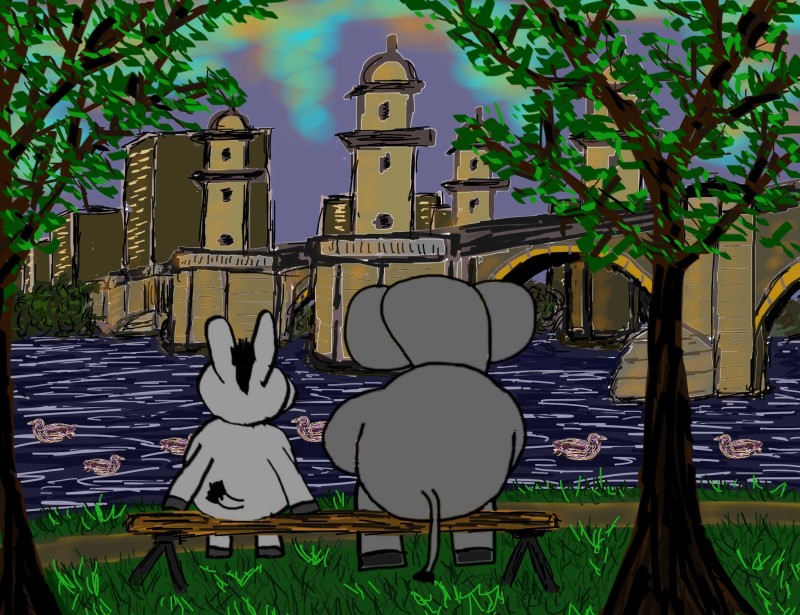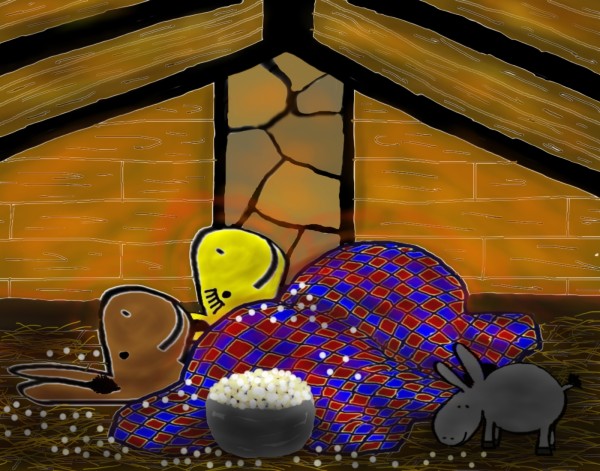Where is everyone? said Harlan. I don’t know, said Blurtso,
I guess people don’t eat on Thanksgiving.
Tag: boston
“Blurtso and Harlan rake the leaves”
“Ditto continues to think about color”
“Blurtso is awash in anticipation”
“Weohryant University” (XXI)
“Weohryant University” (XVII) – Where 101
Today’s question, said Harlan, is: “Where’s the door?”
The door? said Morton.
What door? said Frank.
There are lots of doors, said Chelsea.
You can’t swing a cat, said Frank, without hitting a door.
Maybe it’s a symbolic door, said Glouster.
An entrance door or an exit door? said Emma Lou.
Why do we want to find it? said Chelsea.
So we can get out, said Morton.
What if there’s no exit? said Frank.
Then we’ll have to stay here, said Morton, until we find it.
Or find an entrance, said Emma Lou.
An entrance? said Morton.
Yes, said Emma Lou, if we can’t get out, maybe we can get in.
Why do we want to go anywhere? said Morton.
That’s a good question, said Glouster.
To see what’s on the other side, said Chelsea.
The other side? said Morton.
Yes, said Chelsea, whenever I see a door, I wonder what’s on the other side.
Even when it says “do not enter”? said Morton.
Yes, said Chelsea, especially then.
Curiosity killed the cat, said Frank.
It did? said Morton.
If that’s true, said Chelsea, why arent’ there dead cats everywhere?
It’s an idiom, said Glouster.
An idiom? said Morton.
An idiom, said Glouster, is “a set expression of two or more words that means something other than the literal meaning of the individual words.”
Idioms, said Emma Lou, often have a basis in reality.
That’s true, said Frank, like the idiom, “There’s more than one way to skin a cat.”
Why would anyone want to skin a cat? said Morton.
It means, said Glouster, “There’s more than one way to do something.”
Or, “Who let the cat out of the bag,” said Frank.
Why would anyone put a cat in a bag? said Chelsea.
Lots of reasons, said Frank.
Like what? said Chelsea.
To stop cats, said Frank, from chasing birds.
Oh, said Chelsea.
I suppose birds aren’t fond of cats, said Morton.
No, said Frank.
What animals do donkeys dislike? said Emma Lou.
We like all animals, said Chelsea.
Except dogs, said Morton, when they’re nipping and yapping at your heels.
That’s true, said Chelsea, but some dogs are nice.
I don’t like crocodiles and alligators, said Glouster, they remind me of U-boats.
What’s a U-boat? said Chelsea.
A U-boat, said Glouster, is a submarine. The name comes from the anglicized version of the German word, “U-boot,” which comes from the word “Unterseeboot,” which means “under sea boat.” In World War II German U-boats plundered U.S. and Canadian merchant ships carrying supplies to allies in Western Europe.
I hate war, said Chelsea.
How does a submarine go under the sea, said Morton, without water leaking through the doors.
The doors, said Glouster, are air-tight. Nothing can get in or out.
There’s no exit? said Frank.
Not as long as the U-boat is underwater, said Glouster.
I don’t like to be trapped in closed spaces, said Frank.
Nor do I, said Glouster.
I don’t mind, said Emma Lou, as long as I can dig my way out.
“When one door closes,” said Glouster, “another one opens.”
Is that true? said Morton.
It’s an idiom, said Glouster, that means “When one opportunity is lost, another one presents itself.”
I’ve been in a barn, said Morton, that had two doors which were both closed.
What did you do? said Frank.
I stopped thinking about getting out, said Morton, and started thinking about something else.
You opened a door in your mind, said Emma Lou.
That’s right, said Morton.
Maybe that’s the door we should be looking for, said Frank.
The door in our mind? said Morton.
Yes, said Emma Lou, the door to imagination, to new perspectives, possibilities, and opinions.
I use that door all the time, said Chelsea.
It’s a very nice door, said Morton.
And it’s almost always open, said Emma Lou.
Almost? said Chelsea.
Yes, said Emma Lou, sometimes it’s closed by habits and prejudices we’ve adopted from those around us.
A Scottish journalist named Charles Mackay, said Glouster, wrote a book called, Extraordinary Popular Delusions and the Madness of Crowds.
What’s it about? said Chelsea.
It’s a book about crowd psychology, said Glouster, and how individual delusion can become mass delusion.
Mass delusion, said Emma Lou, is called “reality.”
How can you tell, said Morton, if what you believe is a delusion?
That’s a good question, said Chelsea.
What’s the answer? said Frank.
I don’t know, said Morton, maybe that’s the door we should be looking for.
“Blurtso and Harlan consider manipulation”
Do you ever get the feeling, said Blurtso, you’re being constantly manipulated? By the advertisers? said Harlan. Yes, said Blurtso, by the newspapers, and billboards, and radio, and television, and Internet, and loudspeakers at ball games. And signs, said Harlan, painted on city buses? Yes, said Blurtso, everywhere I turn someone is telling me what to want and what to think. And people are inviting the advertisers, said Harlan, to live in their pocket. In their pocket? said Blurtso. Yes, said Harlan, the iPhone6 will be available soon.
“Bonny and Pablo hit the hay” (I)
“Ditto finds a pencil” (III)
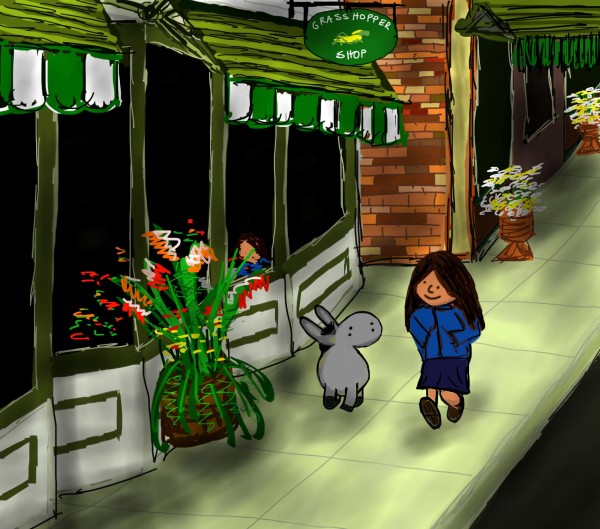
Where’s your pencil? said Virginia. I left it at home, said Ditto. What about the museum, said Virginia, and the tourists and audio phones? I’m not going to do it, said Ditto. Why? said Virginia. I like Concord the way it is. Yes, said Virginia, the library, the cemetery, the inn, and the friendly people at the Main Street Café—it’s a nice town, and more traffic might spoil it. Yes, said Ditto, and encourage someone to put a stop light on Main Street.
“Morton’s Pond” (I)

Hello, said Pablo. Hello, said Morton. What are you doing at Walden Pond? I don’t know, said Morton. You don’t know? said Pablo. No, said Morton. Be careful you don’t get any deer ticks. Deer ticks? said Morton. Yes, said Pablo, spring is the season for deer ticks. Oh, said Morton. Where are the other students? said Pablo. Glouster is in Boston with the ducks at Longfellow bridge, Chelsea is at Emma Lou’s house, Frank is living in the Concord cemetery, and the moose just vanished. Do you have any plans for the summer? No, said Morton, I can’t figure out what to do since the semester ended. Maybe you should spend the summer here. Here? said Morton. Sure, said Pablo. What could I do here? said Morton. You could look at things, said Pablo, and listen to things, and write about what you see and hear. Really? said Morton. Sure, said Pablo, just like Thoreau. Who? said Morton. Henry David Thoreau, said Pablo, a man who didn’t know what to do after he graduated from college, so he moved to Walden and wrote about what he saw and heard. That doesn’t sound very interesting, said Morton. Actually, said Pablo, he became famous. Really? said Morton, just because he didn’t know what to do after college?
